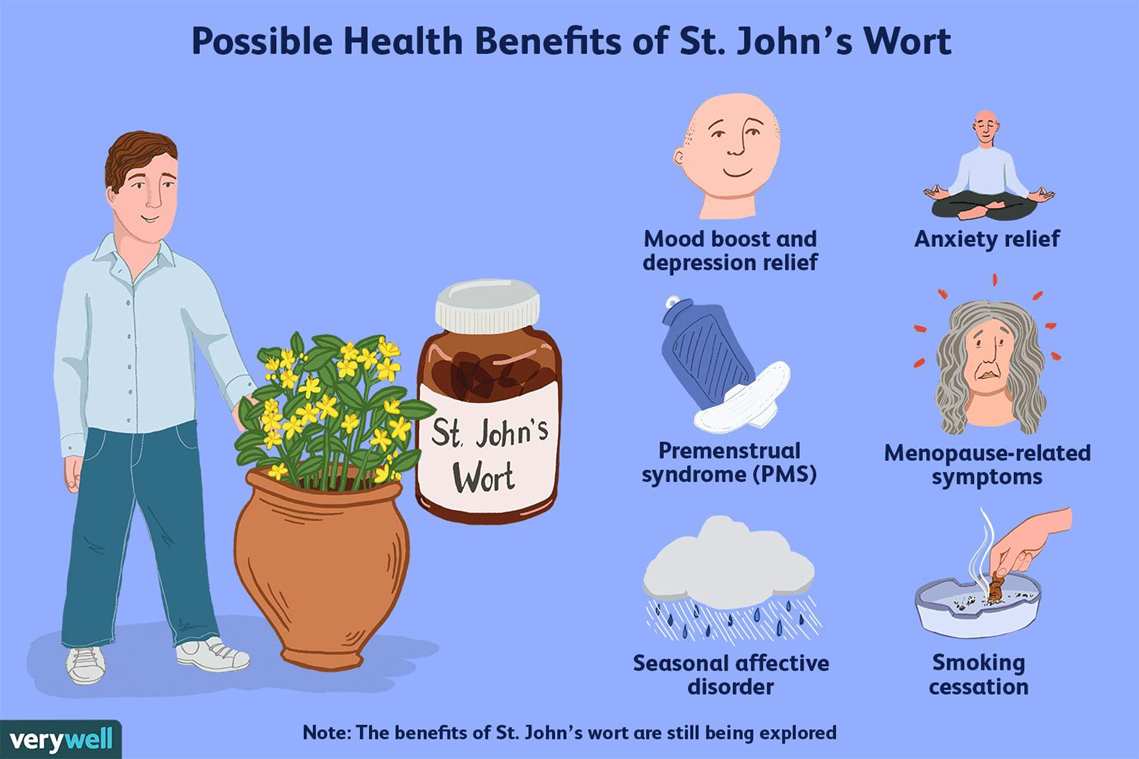A nurse is teaching a client who is about to start taking fluoxetine. The nurse should instruct the client that which of the following supplements interacts adversely with fluoxetine?
St. John's wort
Soy protein
Echinacea
Ginkgo biloba
The Correct Answer is A
Choice A reason:
St. John's wort is known to interact adversely with fluoxetine. Fluoxetine is a selective serotonin reuptake inhibitor (SSRI) used to treat depression and other conditions. St. John's wort also has effects on serotonin, and when taken with fluoxetine, it can increase the risk of serotonin syndrome, a potentially life-threatening condition. Symptoms of serotonin syndrome include confusion, rapid heart rate, dilated pupils, loss of muscle coordination, heavy sweating, and muscle rigidity³. Therefore, it is crucial for patients on fluoxetine to avoid taking St. John's wort to prevent any serious complications.
Choice B reason:
Soy protein is not known to have a significant interaction with fluoxetine. Soy products are commonly consumed foods and are generally considered safe. However, patients should always consult with their healthcare provider before starting any new supplement to ensure it does not interfere with their medication regimen.
Choice C reason:
Echinacea is commonly used to support the immune system, especially for colds and other respiratory infections. There is no well-documented interaction between echinacea and fluoxetine, but as with any supplement, it is advisable to consult with a healthcare provider before combining it with prescription medications.
Choice D reason:
Ginkgo biloba is often used for memory enhancement or to improve circulation. While there are some concerns about ginkgo's potential to affect bleeding due to its blood-thinning properties, there is no direct adverse interaction with fluoxetine. However, patients taking fluoxetine should be cautious with any supplements that can affect bleeding, especially if they are also taking other medications with similar effects.

Nursing Test Bank
Naxlex Comprehensive Predictor Exams
Related Questions
Correct Answer is A
Explanation
Choice A reason:
Implementing seizure precautions is a critical intervention for a client with a history of alcohol use disorder who is admitted while intoxicated. Alcohol withdrawal can lead to seizures, which can be life-threatening. Seizure precautions include maintaining a safe environment, having emergency medication and equipment ready, and monitoring the client closely for signs of seizure activity.
Choice B reason:
Monitoring for orthostatic hypotension is important, especially if the client is experiencing withdrawal symptoms, as dehydration and electrolyte imbalances can occur. However, it is not as immediately critical as implementing seizure precautions for a client who is currently intoxicated.
Choice C reason:
Administering methadone hydrochloride is not an appropriate intervention for alcohol intoxication or withdrawal. Methadone is used for opioid use disorder, not alcohol use disorder, and could be harmful if given to a client with alcohol intoxication.
Choice D reason:
Acidifying the client's urine is not a standard intervention for alcohol intoxication or withdrawal. This intervention is more commonly associated with managing certain drug overdoses or poisonings to increase the elimination of the substance.
Correct Answer is C
Explanation
Choice A reason:
Telling a client to focus on themselves for a change may come across as dismissive and does not address the underlying feelings of hopelessness. It is important for the nurse to acknowledge the client's feelings and provide support rather than suggesting a shift in focus without understanding the root cause of their distress.
Choice B reason:
Asking the client why they feel like things will never work out can be a useful way to explore their thoughts and feelings. However, it may not be the most immediate concern if the client is experiencing severe hopelessness or suicidal ideation. The nurse should prioritize assessing the client's safety and risk of self-harm.
Choice C reason:
Asking if the client has been thinking about harming themselves is crucial in assessing their safety. Suicidal ideation is a serious concern, and it is important for the nurse to directly address this issue to determine if the client is at risk of self-harm. This response shows that the nurse is taking the client's feelings seriously and is concerned about their well-being.
Choice D reason:
Suggesting an antidepressant might make the client feel better can be helpful in the long term, but it does not address the immediate emotional distress the client is experiencing. Medication can be part of a treatment plan, but the nurse should first ensure the client's immediate safety and provide emotional support.
Whether you are a student looking to ace your exams or a practicing nurse seeking to enhance your expertise , our nursing education contents will empower you with the confidence and competence to make a difference in the lives of patients and become a respected leader in the healthcare field.
Visit Naxlex, invest in your future and unlock endless possibilities with our unparalleled nursing education contents today
Report Wrong Answer on the Current Question
Do you disagree with the answer? If yes, what is your expected answer? Explain.
Kindly be descriptive with the issue you are facing.
